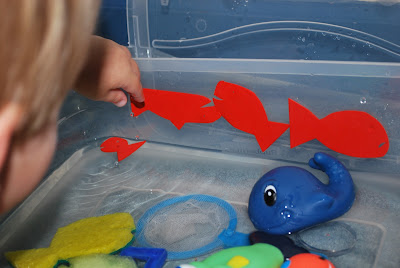This month with a beach theme I wanted to do something different with our sensory box. I know, the common thought would be to use sand in the box but we have a sand table outside and play in it daily. Plus I thought it might make too much of a mess inside!
I placed; water, plastic fish, foam fish, sponges cut into fish shapes, a net, a shovel and a cut in the box. Jake LOVES the water so I knew we did not need too much in the box to keep him happy.
He dug right in! I showed him how to use the net to catch fish, how to squeeze the plastic fish and fill it with water to squirt water. I then let him explore some more and play on his own.
Next, while Jake continued to play I read, Spot Goes to the Beach. This is a fun easy book to read through to point out elements at the beach. This all goes into our preparation for our trip. I want to make sure that Jake is aware of what we will see and do because his only trips have been to my mother's house in Ohio.
When I started reading this page he quickly pointed at the net and held up his net. He even said net which is huge for him because he is not a big talker and most new words must be prompted out of him!!
Later he started putting the foam fish on the side of the box. They would stick to the side and he liked that. I thought it was a good opportunity to practice counting! There are only 4 foam fish so it is a good way to practice counting without getting in over our head.
We focused on vocabulary a lot too:
*Fish
*Net*Water
*Shovel
*Numbers 1-4








Great idea for a sensory box! Perfect for younger kids!
ReplyDeleteThanks Jill it was fun!
ReplyDelete